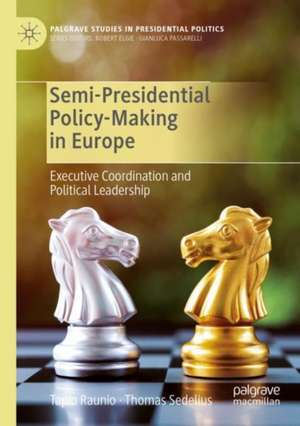Semi-Presidential Policy-Making in Europe: Executive Coordination and Political Leadership: Palgrave Studies in Presidential Politics
Autor Tapio Raunio, Thomas Sedeliusen Limba Engleză Paperback – 14 aug 2020
| Toate formatele și edițiile | Preț | Express |
|---|---|---|
| Paperback (1) | 461.80 lei 39-44 zile | |
| Springer International Publishing – 14 aug 2020 | 461.80 lei 39-44 zile | |
| Hardback (1) | 525.54 lei 3-5 săpt. | |
| Springer International Publishing – 30 mai 2019 | 525.54 lei 3-5 săpt. |
Preț: 461.80 lei
Preț vechi: 501.95 lei
-8% Nou
Puncte Express: 693
Preț estimativ în valută:
88.36€ • 92.75$ • 73.34£
88.36€ • 92.75$ • 73.34£
Carte tipărită la comandă
Livrare economică 07-12 aprilie
Preluare comenzi: 021 569.72.76
Specificații
ISBN-13: 9783030164331
ISBN-10: 3030164330
Pagini: 169
Ilustrații: XIII, 169 p. 5 illus.
Dimensiuni: 148 x 210 mm
Ediția:1st ed. 2020
Editura: Springer International Publishing
Colecția Palgrave Macmillan
Seria Palgrave Studies in Presidential Politics
Locul publicării:Cham, Switzerland
ISBN-10: 3030164330
Pagini: 169
Ilustrații: XIII, 169 p. 5 illus.
Dimensiuni: 148 x 210 mm
Ediția:1st ed. 2020
Editura: Springer International Publishing
Colecția Palgrave Macmillan
Seria Palgrave Studies in Presidential Politics
Locul publicării:Cham, Switzerland
Cuprins
1 Introduction.- 2 Institutions, Coordination, and Leadership.- 3 The Semi-Presidential Cases in Comparative Context.- 4 Formal Coordination Mechanisms.- 5 Informal Avenues of Influence.- 6 Decision-Making in Foreign and Security Policies and EU Affairs.- 7 Conclusions.
Notă biografică
Tapio Raunio is Professor of Political Science at Tampere University, Finland. His research interests include legislatures and political parties, the Europeanization of domestic politics, semi-presidentialism, and the Finnish political system. He has published articles in many leading journals, including European Journal of Political Research, Journal of Common Market Studies, Party Politics, Scandinavian Political Studies, and West European Politics. He is a Steering Committee Member of the ECPR Standing Group on Presidential Politics.
Thomas Sedelius is Professor of Political Science at Dalarna University, Sweden. His research focuses on political institutions in new democracies and transitional regimes. His previous work on semi-presidentialism has appeared in leading journals such as British Journal of Political Science, Democratization, and Government and Opposition. In 2015, his article with Olga Mashtaler “Two Decades of Semi-Presidentialism” received the East European Politics Prize. He is a Steering Committee Member of the ECPR Standing Group on Presidential Politics.
Thomas Sedelius is Professor of Political Science at Dalarna University, Sweden. His research focuses on political institutions in new democracies and transitional regimes. His previous work on semi-presidentialism has appeared in leading journals such as British Journal of Political Science, Democratization, and Government and Opposition. In 2015, his article with Olga Mashtaler “Two Decades of Semi-Presidentialism” received the East European Politics Prize. He is a Steering Committee Member of the ECPR Standing Group on Presidential Politics.
Textul de pe ultima copertă
This book explores how power-sharing between the president and the prime minister works in semi-presidential regimes. In contrast to much of the existing comparative work on semi-presidentialism, the book emphasizes the role of institutional coordination at the most concrete level of executive policy-making, and asks how institutional coordination between the president and prime minister influences presidential activism and the balance of power within the executive. The authors develop a tentative framework embedded in institutionalism and based on four strands of research – semi-presidentialism, public administration, political leadership, and foreign policy analysis – which is subsequently applied to the cases of Lithuania, Romania and Finland. Given the political challenges facing many semi-presidential countries, the study ultimately seeks to identify institutional solutions that facilitate power-sharing and successful policy-making.Tapio Raunio is Professor of Political Science at Tampere University, Finland. His research interests include legislatures and political parties, the Europeanization of domestic politics, semi-presidentialism, and the Finnish political system. He has published articles in many leading journals, including European Journal of Political Research, Journal of Common Market Studies, Party Politics, Scandinavian Political Studies, and West European Politics.
Thomas Sedelius is Professor of Political Science at Dalarna University, Sweden. His research focuses on political institutions in new democracies and transitional regimes. His previous work on semi-presidentialism has appeared in leading journals such as British Journal of Political Science, Democratization, and Government and Opposition. In 2015, his article with Olga Mashtaler “Two Decades of Semi-Presidentialism” received the East European Politics Prize.
Thomas Sedelius is Professor of Political Science at Dalarna University, Sweden. His research focuses on political institutions in new democracies and transitional regimes. His previous work on semi-presidentialism has appeared in leading journals such as British Journal of Political Science, Democratization, and Government and Opposition. In 2015, his article with Olga Mashtaler “Two Decades of Semi-Presidentialism” received the East European Politics Prize.
Caracteristici
Examines how leadership in foreign and EU policies work in the three semi-presidential regimes Emphasizes the role of institutions without neglecting other variables such as party system dynamics or the broader political culture Contributes to literature on semi-presidential regimes, presidents, and policy-making






